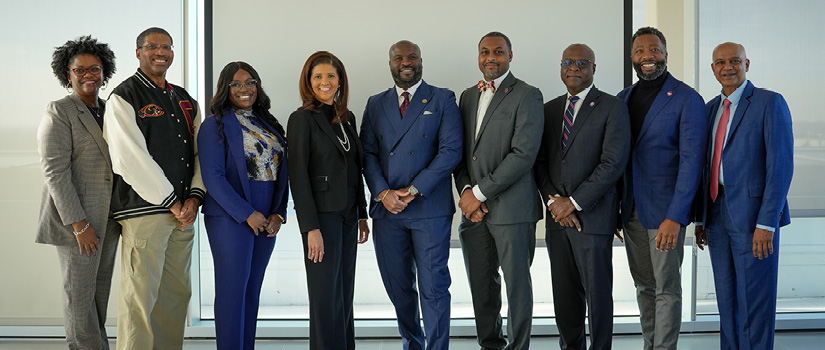USC, the Moore School and South Carolina HBCUs working together for collective impact
Moore School deans and senior staff recently met with business school deans and administrators of South Carolina HBCUs to begin brainstorming how the institutions can collaborate to create, enhance and elevate programs for South Carolina’s students and workforce.
USC vice president of the Office of Access and Opportunity Julian Williams was also in attendance to potentially partner with the Historically Black Colleges and Universities administrators on a university-wide level.
Spearheaded by the Moore School’s Office of Access, Opportunity and Community Engagement, the inaugural collaboration meeting had several objectives including:
- Boosting awareness of programs and initiatives across South Carolina institutions
- Establishing a collaborative framework to address the needs of South Carolina students
- Cultivating synergy between schools to collectively leverage their distinct competencies for impactful workforce and economic development across the state
The ultimate goal of further collaboration among South Carolina higher education institutions is to help educate and prepare South Carolina residents for success, said Deborah Hazzard, associate dean of access, opportunity and community engagement for the Moore School.
“When we educate people in South Carolina, then we have a more qualified and capable workforce,” Hazzard said. “The state will reap the benefits through economic development. Then more companies will want to come to our state because we have a more skilled workforce.”
Talent retention is a critical component for the development of the state's workforce and to attract new industries to come to our state, agreed Benedict College business school Dean Tracy Dunn. Dunn, a two-time Moore School alumna: ‘96 MBA, ‘03 Ph.D., business administration, is also the first female dean for their business school.
“All South Carolina students would benefit from a more vibrant state economy. If our
collaboration is successful, recruiting students and keeping our graduates ‘local’
will become much easier,” Dunn said. “I believe that colleges benefit from having
alumni who live and work in close proximity to their alma mater because those alumni
are more likely to invest their time and financial resources, which strengthens the
institutions.”
Collaborating together
Moore School Dean Rohit Verma acknowledged that one institution in South Carolina cannot do everything on its own and that each has strengths and constraints.
“We are constrained by how many majors and the amount of research we can do ourselves,” Verma said. “If we limit ourselves and do not collaborate, we are not doing our best to give back to the state. With our collective strength — our academic programs and faculty research working together — access and opportunity for South Carolina students will be more widely available.”
Williams said he sees the opportunity for the HBCUs and USC to partner instead of compete.
“We are all aligned together to educate students of our nation and South Carolina,
and by providing opportunities, we know that is trajectory-changing and is a life-changing
education,” he said. “Many of us are products of that and see how our degrees provide
a career impact. USC, the Moore School and HBCUs need to partner more closely together
to match students with opportunities at our institutions with cutting-edge degree
programs and to meet the needs of this labor market.”
HBCU partners
Included in attendance representing the HBCUs:
- Allen University Business School Dean Flavia Eldemire; Allen University business instructor Jordon Jakubek
- Benedict College business school Dean Tracy Dunn
- Claflin University business school Dean Nicholas Hill; Claflin University management interim department chair and assistant professor Johnny Lowery
- Clinton College business school Dean Ifeanyi Ugboaja; Clinton College project manager and business professor Sarah Rucker
- South Carolina State University Marketing Associate Professor David Jamison
The business school deans for SC State, Denmark Technical College, Morris College and Voorhees College are part of the ongoing collaborative discussions but were unable to attend the initial brainstorming event.
Each of the HBCU deans and senior staff shared the program highlights of their institutions’ business schools and mentioned possible ideas for collaboration with the Moore School, USC and each other.
Allen University’s Dean Eldemire said the partnerships the institutions are seeking to create are vital for South Carolina’s future workforce because currently, universities in other states are “poaching” South Carolina students, making it difficult for talented students to choose to stay in state.
She said she sees possibilities for faculty exchanges and professional development among the institutions as well as sharing certain programs like professional certificates or certain high-demand-skills courses.
Along with initiatives similar to Eldemire’s, Clinton College’s Dean Ifeanyi Ugboaja said his growing institution seeks to explore joint projects that leverage the unique strengths and expertise of the South Carolina institutions, including collaborative endeavors in securing grants to fund programs.
“Additionally, we aspire to establish mentoring programs and internships for our students
that provide a link between academia and experiential learning,” Ugboaja said.
Moore School contributions
Related to shared student experiential learning opportunities, the Moore School’s Verma suggested the institutions consider partnering on student case competitions, career development, possible online courses and other initiatives.
Verma also adds that he sees the potential for more widely shared faculty research, as “no university can have faculty on every topic.”
The group of HBCUs and the Moore School “should start one initiative this year and build on it for future years,” Verma said.
Verma also emphasized that the institutions could also work together to raise funds to support some of the future programs. The Moore School’s development team is already working on engaging with donors who want to support access and opportunity initiatives like those that may come from the collaboration with HBCUs.
